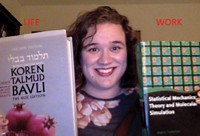Advertisement
Grab your lab coat. Let's get started
Welcome!
Welcome!
Create an account below to get 6 C&EN articles per month, receive newsletters and more - all free.
It seems this is your first time logging in online. Please enter the following information to continue.
As an ACS member you automatically get access to this site. All we need is few more details to create your reading experience.
Not you? Sign in with a different account.
Not you? Sign in with a different account.
ERROR 1
ERROR 1
ERROR 2
ERROR 2
ERROR 2
ERROR 2
ERROR 2
Password and Confirm password must match.
If you have an ACS member number, please enter it here so we can link this account to your membership. (optional)
ERROR 2
ACS values your privacy. By submitting your information, you are gaining access to C&EN and subscribing to our weekly newsletter. We use the information you provide to make your reading experience better, and we will never sell your data to third party members.
Employment
Bench & Cubicle
Tapping into your inner focus
Chemjobber on how carving out time for intense concentration can help your career
by Chemjobber
January 15, 2020
| A version of this story appeared in
Volume 98, Issue 3

The start of the new year brings fresh determination to old battles, and none is more fierce than the battle for our attention. Phones chirp and vibrate, computers ping, and coworkers chatter in open offices. Have you ever tried to have a serious conversation about scientific or business strategy while a printer repeatedly jams half a meter from your head? I have. It’s not good accompaniment.
In his book Deep Work, Cal Newport, an associate professor of computer science at Georgetown University, advocates for massive retaliation in the war for our attention. Stop distracting ourselves with social media, forsake the constant stream of emails, think hard about what we do best, and make time for it—a lot of time, he says.
I bought this book almost 2 years ago but avoided reading it until now because I suspected that Newport had some critiques of my overly electronic life. My job requires a high degree of connection: I am constantly communicating with customers, scientists, and other departments, as well as planning and running meetings. And much of this communication is done via email and other electronic means. Am I truly creating value, or is this “shallow work,” as Newport puts it?
What is deep work in the chemical enterprise? Learning and understanding chemistry, reading papers, and synthesizing the science take a great deal of concentration and can’t be done well while your phone is buzzing constantly or you’re being interrupted by your coworkers. Poring over your notebooks and deciding which direction to take your research are perhaps the most important kinds of deep work, especially for chemists in graduate school. Writing grant proposals and papers also require deep concentration.
Newport describes prominent scientists and writers who have adopted a monastic approach to deep work, in which they make themselves difficult to contact by phone or email, and they disappear for months at a time to concentrate and create. Because this setup is impossible for most working professionals, the rhythmic approach might work better, in which for an hour a day you avoid meetings and conversations and dive into solving your most complex problems. There’s also the bimodal approach, in which you block off weeks for your creative endeavors.
Finally, Newport suggests the journalistic approach, in which you squeeze in an hour or two a day wherever you can. I think we’d all like to be able to do this, but I think it takes a trained mind and a certain kind of project that can be put aside briefly.
I get the point that Newport is arguing: the best work that we do is nearly always the fruit of some kind of deep concentration. When I was able to sequester myself away from the rattling hoods or the rock music (some of it my own) blasting in the laboratory and hide in a quiet nook of the library, I was able to do some of the best studying, understanding, synthesizing, and planning of my graduate career.
But I also believe that it’s not all or nothing. As an inveterate Twitter user, I think Newport misses some of the good that comes from social media. Is Twitter distracting? Yes, it is. But it also provides us with ideas and feedback in real time.
While social media will never replace walking down the hall or poking your head into your lab mate’s hood, it can be helpful in creating a sense of community and understanding other scientists a little better.
So whatever your goals are for this year and beyond, remember to make time for deep concentration. It just might give you enough clarity to find value in some of those daily distractions.
Chemjobberis an industrial chemist who blogs about the chemistry job market at chemjobber.blogspot.com. Find all his columns for C&EN and suggest future topics at cenm.ag/benchandcubicle.
Views expressed are those of the author and not necessarily those of C&EN or ACS.





Join the conversation
Contact the reporter
Submit a Letter to the Editor for publication
Engage with us on Twitter